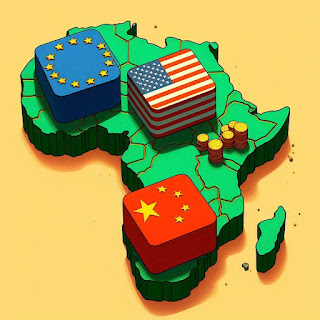I recently had the opportunity to attend a fascinating lecture by Eric Olander, Chief Editor of the China Global South Project, on China's economic engagement in Africa. It was a deep dive into a relationship often painted with broad strokes, revealing a far more complex and nuanced reality. Forget simplistic narratives – this is a story of multifaceted interactions, opportunities, and challenges.
Beyond the Headlines: Unpacking the Complexity
Olander immediately challenged the prevailing "debt trap" narrative, a common misconception that Chinese loans are designed to ensnare African nations. He pointed out that this idea actually originated in 2017 from an Indian analyst, not from the West. The lecture highlighted the sheer scale of Chinese involvement, with China being Africa's largest sovereign lender and a significant contributor to infrastructure development. We're talking about projects like the Standard Gauge Railway in Kenya, massive undertakings that are reshaping the continent's landscape.
However, it's crucial to move beyond generalizations. Olander emphasized the need to understand the different actors involved, from Chinese policy banks and state-owned enterprises to private companies, each with their own motivations and approaches. He also stressed the importance of differentiating between loans and investments, something often blurred in public discourse.
Key Takeaways That Shifted My Perspective:
Debt Realities: While Chinese lending did peak at 20% of Africa's public debt, it's now around 12%. The lecture also shed light on the often-overlooked role of Eurobond debt in African economies. Debt restructuring is a major challenge for countries like Kenya, Zambia, Ethiopia, and Ghana.
FOCAC: Fact vs. Fiction: The Forum on China-Africa Cooperation (FOCAC) pledges are often misunderstood. Olander noted that around 60% of these pledges are actually followed through, which is a higher rate than many might expect.
FDI Facts: China isn't the largest foreign direct investor in Africa. The UAE and other countries have significant investments that often fly under the radar.
Manufacturing Hurdles: Africa faces significant challenges in attracting Chinese manufacturing investments, including power and water issues (as seen in Kenya and the Democratic Republic of Congo) and inadequate road infrastructure (Liberia and Ghana).
A Shifting Global Landscape: Europe's Retreat and China's Opportunism
The discussion also prompted me to consider the broader geopolitical context. While China's influence in Africa is undeniable, it's happening against a backdrop of shifting global dynamics. We're seeing a gradual diminishing of the European role in Africa, while in other regions, like the Pacific, European nations are increasing their involvement, for example to enhance fish exports. It's an interesting dynamic, and sometimes the Chinese piggyback on this, exporting to the EU under a Pacific flag.
The Path Forward: Transparency and Understanding
Ultimately, Olander's lecture underscored the need for more transparency and a deeper understanding of Chinese investments and loans in Africa. African policymakers need access to accurate information to make informed decisions that benefit their countries. This nuanced perspective is also crucial for shaping academic research, policy formulation, and public discourse on China-Africa relations.
China's engagement in Africa is a complex and evolving story. By moving beyond simplistic narratives and embracing a more nuanced understanding, we can better grasp the opportunities and challenges that lie ahead. The lecture left me with a renewed appreciation for the complexities of international economic relationships and the importance of critical thinking in a world saturated with information.

No comments:
Post a Comment
Note: only a member of this blog may post a comment.